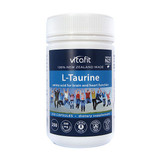Vita-Fit
L-Taurine 500mg
Bonus
Description
Ingredients
Directions + Precautions
About Vita-Fit
Related Categories
Highlights
Mindful Brand
Vita-Fit is a Mindful Brand. They’re committed to meaningful change that looks after our people and planet.
Learn more
- Description
- ingredients
- directions + precautions
-
about Vita-Fit
Vita-Fit is a Mindful Brand Learn more about Mindful Brands
Environmentally Sustainable
Good for nature.
These brands choose to be greener by
looking after the health of our planet. SHOP BRANDSTransparent
Open in their approach.
These brands disclose the
difficult to discover details. SHOP BRANDSSocially Responsible
Socially conscious.
These brands put people at the heart
of every decision. SHOP BRANDS - Related Categories


